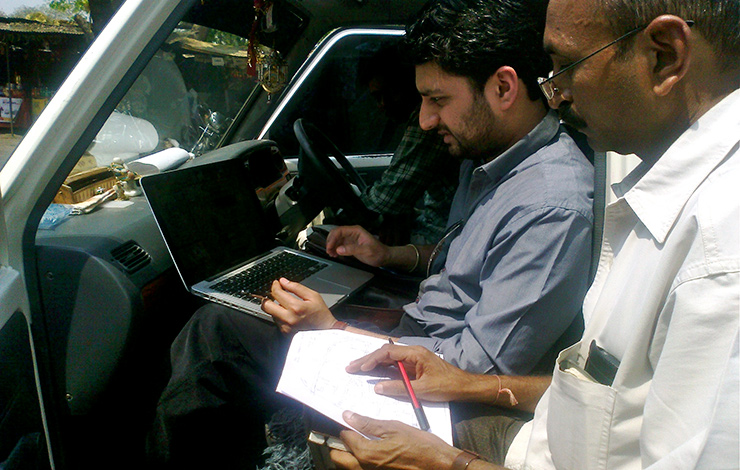India and Nepal have experienced urbanization at a faster rate than most countries, and as a consequence, city police forces are not adequately trained to cope with the challenges of policing rapidly urbanizing populations. This program is creating a low-cost mobile platform that allows police to access short trainings and informational videos from their mobile phones.
Challenge

As India and Nepal enter an urban era, their city police forces are not adequately trained to cope with the challenges of policing urbanising populations. Research shows that training methods are not dynamic, are infrequent after initial recruitment and have not been updated in line with new urban realities. As per the WJP Rule of Law Index, India ranks 96th (only above Pakistan) in Order and Security, and 64th in terms of Criminal Justice and Fundamental Rights. Nepal ranks slightly higher than India (58th in terms of Order and Security, and 40th in terms of Criminal Justice) but it continues to be one of the lowest ranked countries in terms of Civil Justice (83rd).
India and Nepal have been experiencing urbanisation at a rate faster than most other countries with their cities as engines of economic growth in the region. However, urbanisation has also placed severe pressures on service provision systems, with vast urban populations turning to the informal sector for basic services such as housing and water. Thus, policing rapidly urbanising areas has also brought its challenges. In low- and middle- income countries these are articulated through high levels of absolute deprivation and inequality, heightened conflict over resources, reliance on illegal provision of basic urban services, ‘informalization’ vast amounts of city space, and the importance of informal local structures in maintaining order (UNODC 2013). Unplanned urbanisation only heightens these challenges by causing the goal post to constantly shift. Recently, the Chief Minister of Karnataka, a state in southern India, described policing as a “casualty of massive urbanisation” (Firstpost, Nov 8th 2013). It is evident that police training and numbers of police personnel have not kept up with surge in urban populations.
In India, this is particularly evident in newer peri-urban townships or areas in which government schemes relocate large numbers of people. From previous research, it is evident that police personnel in these emergent areas are not adequately trained to deal with the issues they face (Gupte 2010), and this results in gross under-performance. In Nepal’s post-conflict scenario, rapid urbanisation has brought a different set of challenges, primarily in terms of newer modalities of crime, which have caused the security provision scenario to change drastically from counter-insurgency to violent urban crimes like robbery and homicide. Research shows that police personnel are not trained for this changed scenario, and are not able to cope with the rising levels of urban crime (Bogati and Gupte forthcoming).
Program Summary
Serving and retired police personnel of varying ranks and in various cities when interviewed for recently conducted studies indicated that while urban-specific training is lagging far behind international standards, solutions needs to be low cost, scalable with large outreach, innovative and easily updateable.
IDS will develop an innovative low-cost mobile-based visual training system that:
- is designed to complement existing training modules;
- provides urban police personnel with a platform to access short training and informational videos via multi-media messages on their mobile phone; and
- enables effective evaluation and monitoring.
The platform will consist of a database of instructional and informational videos on a variety of themes, from which police personnel can request a video, or a video can be ‘pushed’ onto the mobile phones of particular target groups of personnel (selected by rank or jurisdiction, or at a particular time, for example). The videos will be sent in multi-media message (MMS) format, a format police personnel are well versed in using, but also be made available in high-definition for use in the respective training academies. The platform will make use of the existing phones of police personnel, and as such, will also allow for easy monitoring and evaluation. IDS will run a six month pilot in three cities (Kathmandu, Nepal, and Mumbai and Thiruvananthapuram, India).
Police forces across South Asia already use instructional videos/films in aid of training modules. These however tend to be long (20 minutes on average), are rarely updated, and viewings by personnel are limited at best to quarterly training sessions, or at worst to only during initial training after recruitment. Features of the proposed platform include:
- Short videos (five to six minutes long) – catchy, easy to understand
- Content based on the most recent national and international urban policing training methods and manuals (for example, the UNODC 2013).
- Videos can be requested by personnel depending on need.
- Videos can be ‘pushed’ to particular groups of personnel (by rank, or jurisdiction, in preparation for a particular event, for example).
- Highly scalable, depending on size or needs of city.
- Updated content can easily be circulated to personnel.
System evaluation can be two-fold: Videos can be evaluated (via rating) by personnel, while viewing patterns of personnel can also be monitored.Initial list of themes to be included in the pilot. Each theme will have a series of sub-themes, and for the pilot, three videos will be prepared under each theme, such as:
- Good police-public interactions and best practices
- Investigation - arrests - interrogation
- Traffic regulation and conduct of traffic police while on duty
- Use of minimum force in crowd control
Impact
The direct beneficiaries of the program will be police personnel because a well-trained police force is critical for effectively dealing with the challenges of urban living and upholding the rule of law. The program will look to improve the capacity of city police in investigating and adjudicating criminal offences effectively, without any partiality, and without improper influence, while ensuring that the rights of suspects and victims are protected.
Partners
Partners include:
- Lead Consultant, India – Mr Rajan Medhekar, former Director General, National Security Guard and for Director General of Police in Kerala (retd).
- Lead Consultant, Nepal – Mr. Subindra Bogati, Nepal Peacebuilding Initiative, Nepal.


